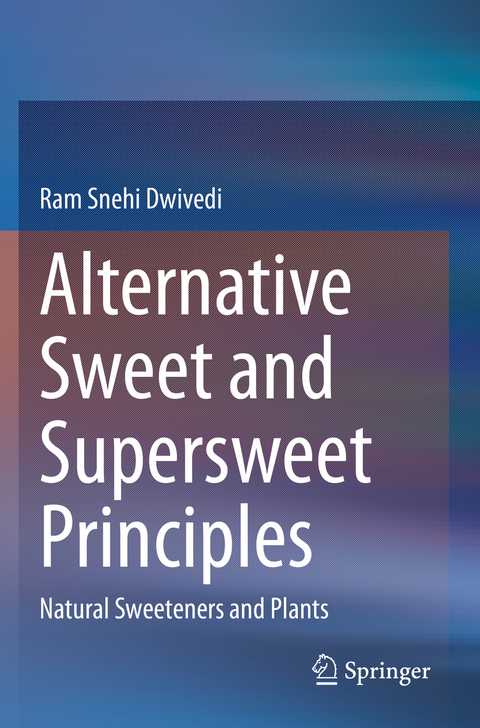
Alternative Sweet and Supersweet Principles
Springer Verlag, Singapore
978-981-336-352-6 (ISBN)
This book compiles the latest information on different kinds of natural, plant-based super sweeteners. A book on alternative, natural super sweeteners is extremely timely and useful, especially, in light of the decreasing cultivable area, ever increasing demand for sucrose, and the well identified ills of sugar consumption. Every year more than 5.0 million people die due to diabetes and diabetes-associated diseases like cardiovascular, kidney disorder, liver cancer etc.
This book describes the use of non-saccharide super sweet principles to counter such maladies. The readers will get an in-depth understanding of different kinds of sweeteners, molecular basis of sweetness, their general classification, plant source with photo-plates etc. The chapters explain different kinds of super-sweet principles. This book emphasizes on the propagation, cultivation and conservation of NSSS plants (NSSSP) and extraction of super sweet principles and granting of generally recognised as safe (GRAS) certificate to sweeteners. The concluding chapter describes the eco-physiological difference between saccharide super sweet and non saccharide sweet plants. The book also describes commercial production of selected potential Natural Super Sweeteners.
This book will be of great interest to researchers, extension workers as well as postgraduate students in Food science nutrition, ayurveda, plant physiology, Unani, naturopathy, biochemistry and plant breeding. It would also be of interest to industry stakeholders in sweetener industry and alternative sweetener manufactures.
Dr. R.S. Dwivedi obtained his Ph. D. degree from BHU, Varanasi, India and post Doctoral training from Tokyo University Japan. He started his career as Assistant Plant Physiologist at PAU, Ludhiana, India, he worked as a Plant Physiologist (Radio Tracer) CPCRI, Kerala, CSSRI, (ICAR) Karnal and Head of Division (Plant Physiol. & Microbiol.) NRCG (ICAR) Junagarh, (Guj.) and HOD (Plant Physiol and Biochem.) IISR (ICAR) Lucknow, India. He was the Director at NRCG (ICAR), Junagarh, India, Director IBBS Varanasi. Currently, he is the Director, PHSS Foundation for Science and Society, Lucknow U.P., India. Prof. Dwivedi has worked on solar energy harvest, stress physiology, micronutrients and natural sweeteners for which he has been awarded many national and international awards; these include- J. J. Chinoy Gold Medal - Indian Soc. PI. Physiology, New Delhi; Invention Intelligence Award - Govt. of India, New Delhi; Most Active Discussant, Tokyo University, Tokyo, Japan; SeniorAAAS Award - Indian Soc. Pl. Physiology, New Delhi; Drought Research Distinction - North Carolina University, USA etc. He has been the President of Indian Soc. Plant Physiology, New Delhi, editor-in-chief - J. Agrotech. Bioenergy and on the editorial board of several journals. He has 220 publications and 6 books to his credit. Prof. Dwivedi has over 30 years of research and 20 years of teaching experience and so far supervised 7 doctoral students.
Chapter 1. Introduction.- Chapter 2. Search of Sweeteners, their general classification, synthesis, and saccharide sweeteners plant - animal interphases.- Chapter 3. Molecular basis of sweetness and recent concepts, An ideal sweetener and saccharide and non-saccharide sweet principles qualifying it.- Chapter 4. Saccharide sweet (SS) principles, classification and structural and functional details of SS sweeteners and plants.- Chapter 5. Non saccharide super sweet principles, their general characteristics, outline of synthesis, classification, ecological significance and eco-friendly adherence.- Chapter 6. Perillartine (Mono-terpenoid).- Chapter 7. Steviosides (Diterpenoids).- Chapter 8. Triterpenoids.- Chapter 9. Hernandulcin: (Sesquiterpene).- Chapter 10. Falvonoid Super Sweet Principles Dihydrochalcone.- Chapter 11. PHYLLODULCIN.- Chapter 12. Osladin, Polypodoside A, B, and C (Steroidal saponins).- Chapter 13. Monatin:(Super Sweet Amino acid).- Chapter 14. Super sweet and tastemodifier proteins.- Chapter 15. Vegetal Taste modifiers.- Chapter 16. Eco-Physiological difference between sacchariferous sweet (SS) and non sacchariferous super sweet (NSSS) principles and Plants.- Chapter 17. Molecular approaches for the improvement of Non sacchariferous super sweet (NSSS) plants.- Chapter 18. Commercial Production of natural NSSS sweeteners-A concised sketch.
| Erscheinungsdatum | 27.09.2023 |
|---|---|
| Zusatzinfo | 1 Illustrations, black and white; XXIX, 773 p. 1 illus. |
| Verlagsort | Singapore |
| Sprache | englisch |
| Maße | 155 x 235 mm |
| Themenwelt | Medizin / Pharmazie ► Physiotherapie / Ergotherapie ► Orthopädie |
| Naturwissenschaften ► Biologie ► Botanik | |
| Technik ► Lebensmitteltechnologie | |
| Technik ► Medizintechnik | |
| Schlagworte | alternative sweetener • natural sweetener • saccharide • secondary metabolite • sweet amino acid • Sweetener • terpenoid |
| ISBN-10 | 981-336-352-5 / 9813363525 |
| ISBN-13 | 978-981-336-352-6 / 9789813363526 |
| Zustand | Neuware |
| Informationen gemäß Produktsicherheitsverordnung (GPSR) | |
| Haben Sie eine Frage zum Produkt? |
aus dem Bereich


